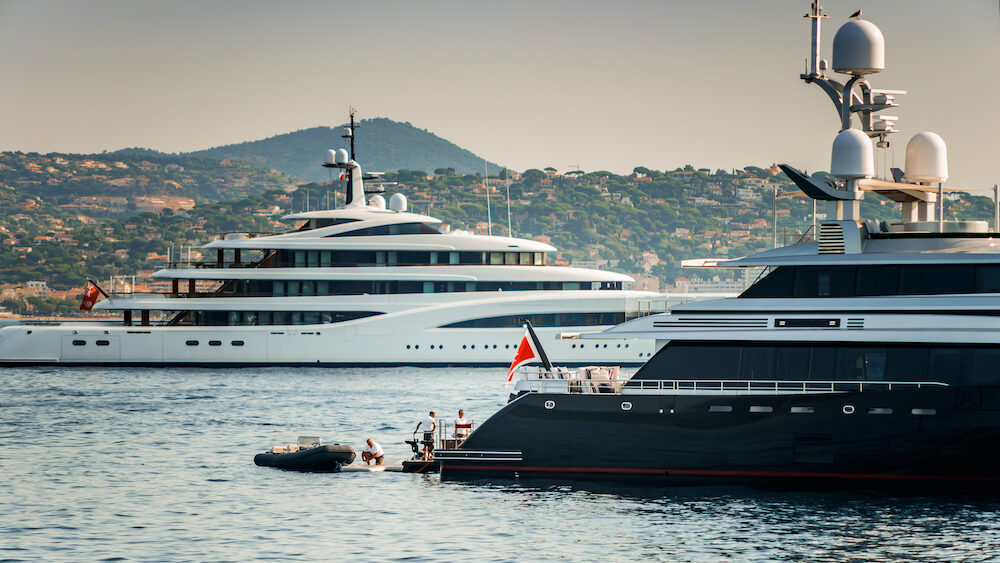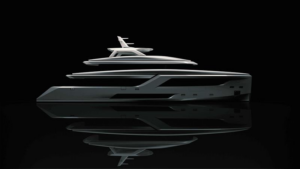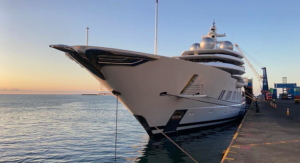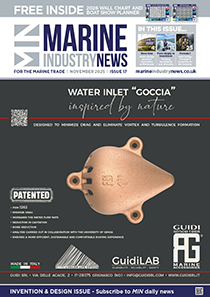New environmental crew guidelines hope to reduce superyacht impact
 Two Super Yachts anchored in the Gulf of Staint-Tropez, one with crew and tender at the back working on deck.
Two Super Yachts anchored in the Gulf of Staint-Tropez, one with crew and tender at the back working on deck.
Version 1 of the Environmental Crew Guidelines has been released by Water Revolution Foundation. Written for and by crew, the guide highlights best practices, offering information and inspiration for more eco-friendly behaviour onboard yachts.
Aimed at achieving a substantial accumulated reduction in the environmental impact of the 5,500 30m+ fleet, this is a collaborative effort between Water Revolution Foundation, initiator MB92, and creator Danella Hopkins (formerly of S/Y Black Pearl). This free and open-source tool offers 24 distinct sections, providing crews with a detailed, holistic overview of how to adopt more conscious and sustainable practices into their daily routines.
Contributions from industry experts and crew members have ensured that a diverse range of perspectives and experiences are included. As a first version, the aim is to collect feedback and additional best practices from crew to expand on the content and launch a Version 2 in the future.
Powered by industry leaders
To ensure the widespread adoption of these guidelines and enable a united, coordinated action, industry leaders including MB92, Burgess, Damen Yachting, Heesen Yachts, Lürssen, Sanlorenzo, and Y.CO have pledged their commitment as official supporting companies. S/Y Black Pearl and MY Savannah have also come onboard as ambassadors within the fleet.
“These clear guidelines are applicable to every size and type of yacht operation and by sharing them with our crews as part of our fleetwide sustainability efforts, we hope to provide a strong foundation for better onboard environmental practices and show that any yacht, regardless of its size or build, can make a big difference in little ways,” shares yacht management company Y.CO.
Addressing yachting’s environmental impact
Many technical and digital solutions have already been introduced to drive the superyacht industry’s energy transition. However, these developments address only one facet of the challenge, a transition in onboard practices is also necessary.
“There are immediate actions that crew can take on board to introduce more environmentally friendly practices, which can significantly reduce emissions (by up to 30 per cent), whether by optimising temperature settings, making slight adjustments to cruising speeds or employing effective resource management,” says MB92.
This initiative is designed to provide crew with an extensive knowledge base and practical tools to foster a concrete shift toward sustainable superyacht operations.
Inside the environmental superyacht guidelines
Organised under three overarching themes – onboarding guidelines, general guidelines, and departmental guidelines – this document will cater to crew at every level. The Onboarding Guidelines emphasise ways in which crew can cultivate an environmental mindset and commit to improved operational practices. Fundamental principles and standards applicable to all crew members in their daily tasks are outlined in the general guidelines, while the departmental guidelines delve deeper, addressing the unique needs and individual responsibilities of each department.
“We understand that environmental sustainability can be challenging to accomplish onboard and there is no one-size-fits-all approach,” explains executive director of Water Revolution Foundation, Robert van Tol. “By working together with crew, we hope to inspire and facilitate this powerful group to minimise their yacht’s daily footprint where possible.”
To ensure proper enforcement onboard, the guidelines introduce the nomination of an eco-sustainability ambassador. This dedicated crew member will collaborate with heads of departments to streamline processes and drive the implementation of initiatives by supporting crew, monitoring progress and reporting achievements.
“Our industry can collectively create lasting change in its outlook and operations by working together, and these guidelines will help yacht crews and shoreside management teams reduce their environmental impact through improved efficiency and better practices,” states Burgess. “When passionate individuals are given the chance to do the work they believe in, good things can happen, and in this way, we are committed to building a more environmentally aware and responsible industry.”
Access the Environmental Crew Guidelines online via Water Revolution Foundation.










